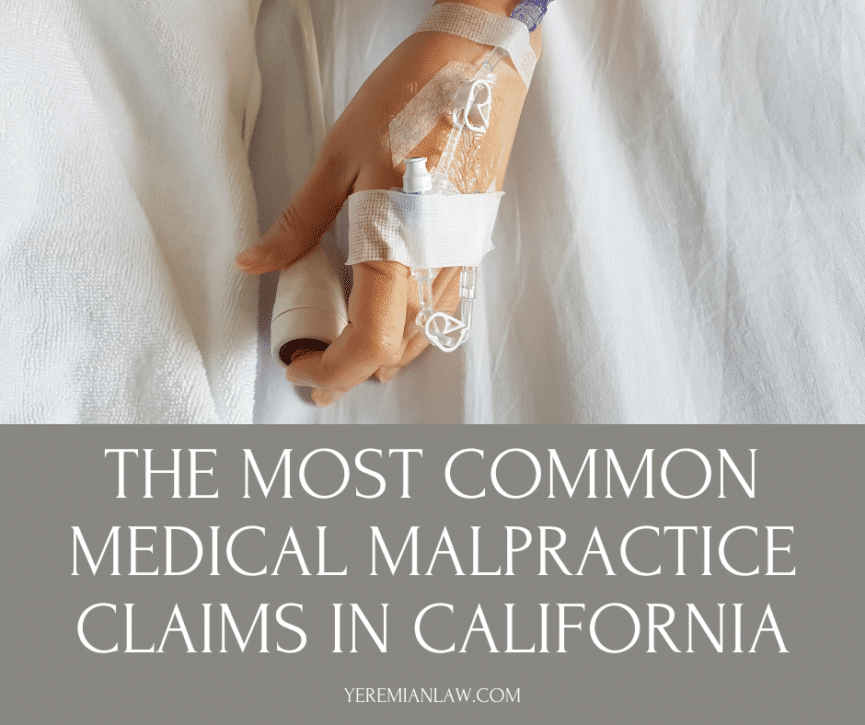Medical malpractice is more common than you may think – particularly in California, where our population is higher than it is in any other state. Medical malpractice occurs when a doctor or another healthcare professional is negligent or fails to act and someone is injured as a result. But what are the most common medical malpractice claims in California? Here’s what you need to know.
The Most Common Medical Malpractice Claims in California
These are the most common medical malpractice claims in the state of California:
- Birth injury claims that involve injuries sustained by a mother or baby
- Surgical malpractice claims, which typically involve surgical errors and injuries sustained during surgery
- Failure to diagnose claims that involve a healthcare professional missing an important diagnosis
- Medication error claims that involve someone giving a patient the wrong medication (or the wrong dose of the right medication)
Here’s a closer look at each.
Related: Guide to medical malpractice in California
Birth Injury Medical Malpractice Claims
Birth injury lawsuits are very common. They occur when a mother or her baby sustains injuries before, during or after the birth, provided that:
- There was a doctor-patient relationship established when the injury took place
- The doctor or other healthcare professional was medically negligent while treating the injured party
- The healthcare professional’s negligence resulted in birth injuries
Some of the most common birth injuries are:
- Brachial palsy
- Bruising or forceps marks
- Caput succedaneum
- Cephalohematoma
- Facial paralysis
- Fractures
- Subconjunctival hemorrhage
A birth injury can range from mild with no lasting complications to severe and debilitating. Some of the most extreme cases of medical negligence involve death.
Surgical Malpractice Claims
Surgical malpractice can apply to doctors, nurses, anesthesiologists and other healthcare professionals involved in surgery. If the negligent or malicious actions of the healthcare professional involved directly cause the patient harm, it’s generally considered surgical malpractice. Usually, this type of malpractice occurs:
- During preoperative care. Surgical mistakes can happen before you arrive in the operating room, such as when a physician doesn’t consult with you properly, identify you before surgery, ensure the your medical history is current or inform you of alternatives to your procedure. It can also occur if your doctor doesn’t inform you of the procedure’s risks.
- During surgery. Sometimes doctors perform surgeries that they’re not exactly qualified to perform, or they’re not alert, attentive or careful.
- During post-operative care. Your doctor is responsible for ensuring a safe recovery from a surgical procedure, including ensuring that you don’t get an infection. He or she should keep you under observation and refrain from discharging you from the hospital until it’s safe to do so.
Related: Can I sue for…
Failure to Diagnose as Medical Malpractice
A healthcare professional’s failure to diagnose you with an illness, condition or disease can constitute medical malpractice. Delayed diagnosis is similar, but it involves your healthcare provider’s eventual diagnosis (the argument with delayed diagnosis is that had your doctor diagnosed you earlier, you would have had better treatment options or your condition could have been cured, reversed or improved).
Misdiagnosis is also very similar, and it occurs when a healthcare provider diagnoses a person with the wrong illness, condition or disease. As a result, the patient misses out on critical care that could have made a difference in his or her outcome.
Medication Error Claims
Medication errors can be extremely dangerous; in the worst cases, they can even be fatal. When a patient suffers an injury due to a medication error, it could be a case of medical malpractice. Healthcare professionals can be considered negligent if they:
- Prescribe the wrong medication as the result of carelessness
- Accidently give someone the wrong dosage of a medication
- Give someone an unintended medication
- Don’t take a medical history that includes prescription drug use to check for possible interactions between drugs
- Fail to warn a patient about the risks associated with a prescribed medication
- Cause a drug interaction by failing to check whether two or more drugs can be taken together
Do You Need to Talk to an Attorney About Medical Malpractice?
If you believe that you or someone you care about has been a victim of medical malpractice, we may be able to help you. Call us at 818-230-8380 to schedule a free consultation with an experienced personal injury attorney in Los Angeles now. We’ll listen to your situation and tell you what to do next.




